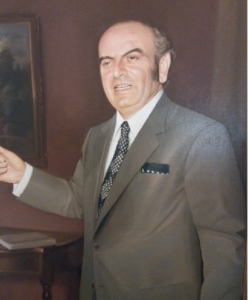
Musa Kermanian
Musa Kermanian was born into a religious Jewish family in 1922 in the Oudlajan neighborhood in Tehran, Iran. His parents were Shamoeil and Shahjahan.
He was educated in Alliance School and Iranshahr high school. He continued his education in the faculty of Law, Political, and Economic Sciences, Tehran University, Tehran, Iran, earning his Ba. in political sciences in 1953 C.E.
Musa lost his father, Shamoeil Kermanian, to Typhus during the Second World War, making him responsible for providing for his mother and ten siblings.
Musa maintained his father’s enterprise in Karaj while continuing his education simultaneously amid the economic depression of the Second World War. He also began his own business with the help of his maternal uncle, first as a contractor and later an importer of agricultural facilities, where he achieved impressive progress in just a short amount of time.
Musa married “Aziza” from the Hakhami family in 1949 C.E., the result of which was a daughter and tow sons. Sam Kermanian continued his father’s path and is now the chairman of the Federation of Iranian Jews, and also an active member of several committees of Los Angeles Jews of America.
Musa Kermanian began his first cultural and social activities from his early youth as the founder of the Brotherhood. They held their first meetings at Kurosh Highschool, Hatef Alley, Tehran, Iran.
He assumed the position of the chairman of the Literary Society and personally saw to the arrangement of scientific sessions and lectures. He published articles on ethics and offered his guidance in order to educate the teenagers and the youth of the community. Some of his writings were also published in Israel magazine, edited by Dr. Rahim Kohen. His passion for writing, especially about people, led him to found the ‘Alam Yahud, i.e. World of the Jews, magazine later in life, where he assumed the position of Editor.
In response to the Fakhr-Arai shooting incident, an unsuccessful attempt to assassinate Mohammad Reza Shah in 1949 C.E., the government decided to proscribe all parties and institutions. The Brotherhood was no exception. However, this did not stop Musa Kermanian. A few years later, he instituted the Great Kurosh Center, with the help of Manuchehr Omidvar, which became an important cultural center for young Semites in Tehran. The success of this center soon led other groups to establish similar cultural and religious institutions in Tehran and other cities.
Musa Kermanian took it upon himself to visit any town or city where Jews lived. This gave him a comprehensive overview of the Jewish diaspora across the country, the information of which he published in several articles under the title “Jews of Iran” in the Semite Community magazine.
Musa Kermanian was recognized as a significant and well-wishing figure of the Jewish community due to his wit and determination for cultural and communal services, specifically for the Jewish community. He was also recognized as an informed and insightful figure, filled with love [for the Jewish community], and a leader from the new generation, due to his studies, research, continuous activities in the publication area, familiarity with the Jewish communities of the world, and participation in cultural, social, and international political conferences and congresses.
Musa spoke fluently in Persian, French, English, and Arabic. His writings were persuasive and his speeches were eloquent. His discussions were polite and respectful. Musa remained an active and prominent member of the Tehran Jewish Committee for several years (during the 1340s on the Persian calendar) and participated as the representative and ambassador of the Society in most international Jewish congresses abroad. His sound and persuasive speeches on behalf of Iranian Jews brought special honor and respect for him. He passionately loved Iran and its people and seamlessly worked to increase respect for Iran among Jews of other countries, introducing this ancient country as one with a glorious history rooted in philanthropy.
Musa was selected as one of the principal members of the executive board of the World Jewish Congress for his experience and the cogent theories he put forward.
Musa Kermanian was elected to the Committee of Tehran Jews for several terms. He had a substantial role in the making of the first Jewish Committee that was convened with the free and direct votes of Jews, and underwent many struggles to do so. He adamantly promoted reformation in Women’s rights in Jewish society. Musa was also extremely active in increasing the social, economic, and cultural wellbeing of the Jewish community, for which he communicated directly with well-intentioned leaders of the community, such as, but not limited to, Mirza Musa Khan Toob, dr Agha jan Toob, Nejat Allah Reanan, Dr Hbib Levi, Haj Habib Elghanayan, Ebrahim Mureh, Yusef Kohen, Sulayman Hayim, Hakham Yadidiya Shoft, Jamshid Kashfi.
Musa Kermanian was also one of the effective figures working for the freedom of Jews of Arab countries, specifically Iraq. He was an influential writer and a reliable translator, which is why his writings were compatible with the lifestyle of the people, and thus respected by them. His first publication was the translation of “Zionism” by Alex Bein, an expository on this historical and political ideology.
Musa was in Europe when the Islamic revolution of Iran occurred [in 1979 C.E.] and had to give in to an unwanted migration. In 1980, he joined his children who were studying in the USA and settled in Los Angeles.
Soon upon realizing the complications that immigrant families had to face, such as acquiring a visa, Musa established a society that was unprecedented up to that time in order to address these complications by directly communicating them to U.S. government officials with the help of leaders and prominent figures among the Iranian Jews in Los Angeles. After several sessions between themselves, they finally scheduled a meeting with the White House. The meeting was convened with the presence of the Vice President of the United States during Jimmy Carter’s presidency, Counselor to the President, Deputy Secretary of State, and the Commissioner for Migration and Citizenship, where Musa explained the issues and complications that migrators faced. The session concluded with the officials agreeing to consider some privileges in visa issuance and settling for Iranian Jews in America.
Musa was also one of the first individuals to create an organization for addressing the social needs of Iranian Jews far from home. He selected a group of intellectual and good-willing Jewish figures who would attempt to defend and promote their civil rights.
Musa Kermanian passed away in 1980 C.E. due to a heart attack, aged 58, when he had just started his social activities in the U.S. He was buried in the Holy Land as he had willed himself. Musa Kermanian had decided to publish an autobiography and compile documents of his social and cultural activities in a book named “Az sare chal ta Los Angeles”, i.e. From the pit to Los Angeles. However, life didn’t offer him enough time.

Musa Kermanian

Marriage of Musa Kermanian with Azizah Hakhami
Tehran 1327 solar

World Jewish Congress

The second person from the right, Musa Kermanian, at the 5th World Jewish Congress in Brussels in 1966


 فارسی
فارسی